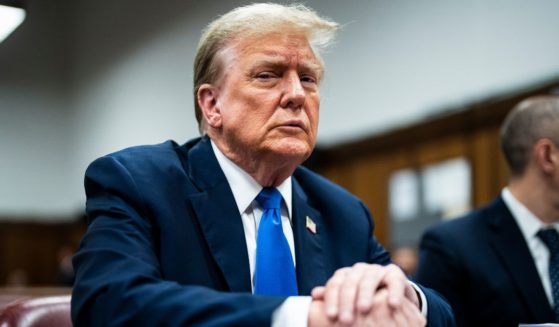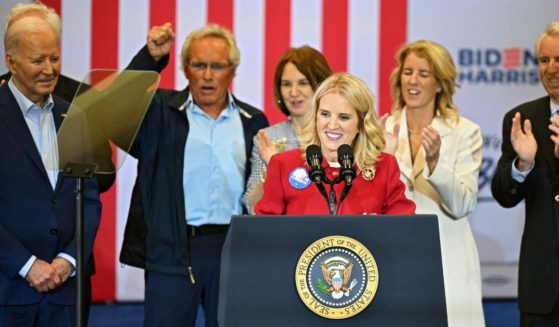Debates Commission Announces Drastic Rule Changes for Final Debate
Incumbent President Donald Trump and Democratic challenger Joe Biden will be facing off under a different set of rules Thursday in the second and final presidential debate of the 2020 election cycle.
The Commission on Presidential Debates announced Monday in an official statement that the microphone would be going dead for candidates not officially granted the floor, in order to prevent interruptions and foster civility.
“Under the agreed upon debate rules, each candidate is to have two minutes of uninterrupted time to make remarks at the beginning of each 15 minute segment of the debate. These remarks are to be followed by a period of open discussion,” the commission wrote. “Both campaigns this week again reaffirmed their agreement to the two-minute, uninterrupted rule.”
“The Commission is announcing today that in order to enforce this agreed upon rule, the only candidate whose microphone will be open during these two-minute periods is the candidate who has the floor under the rules. For the balance of each segment, which by design is intended to be dedicated to open discussion, both candidates’ microphones will be open,” it added.
“During the times dedicated for open discussion, it is the hope of the Commission that the candidates will be respectful of each other’s time, which will advance civil discourse for the benefit of the viewing public.”
NEW: Commission on Presidential Debates announces a change to Thursday’s presidential debate: “The only candidate whose microphone will be open during these two-minute periods is the candidate who has the floor under the rules.” pic.twitter.com/zzGpH2NHHc
— NBC News (@NBCNews) October 20, 2020
The decision came in light of widespread national discussion regarding the lack of decorum displayed in the first debate on Sept. 29, where both Trump and Biden frequently interrupted one another, diverting the conversation to personal attacks and fact checks.
According to CNN, commission members unanimously approved the changes, arguing it was not truly a change to the rules but a restrictive measure pursued in the interest of upholding a previously agreed-upon rule that both candidates would receive two uninterrupted minutes to stump on each topic.
This did not stop the Trump campaign from railing against the decision, with several operatives and communications personnel suggesting Monday that the commission had favored Biden in everything from its choice of moderator to the exclusion of certain topics.
“President Trump is committed to debating Joe Biden regardless of last minute rule changes from the biased commission in their latest attempt to provide advantage to their favored candidate,” campaign manager Bill Stepien responded in a news release. “This was supposed to be the foreign policy debate, so the President still looks forward to forcing Biden to answer the number one relevant question of whether he’s been compromised by the Communist Party of China.”
“Why did Biden allow his son Hunter to sell access to him while he was vice president, and why were there Chinese payment arrangements for Joe himself worked out by Hunter and his sketchy partners? If the media won’t ask Joe Biden these questions, the President will,” he added.
“And there will be no escape for Biden.”
The president himself spoke out similarly, reassuring reporters he would not be backing out over the perceived unfairness.
“I will participate,” Trump said, according to Reuters, “but it’s very unfair that they changed the topics and it’s very unfair that again we have an anchor who’s totally biased.”
NEW: The Trump campaign is calling on the Commission of Presidential Debates to “recalibrate the topics and return to subjects which had already been confirmed” for this week’s final debate. pic.twitter.com/gtYTIdh4eK
— Jennifer Franco (@jennfranconews) October 19, 2020
Concerns about the partiality of the commission first began cropping up in light of Fox News moderator Chris Wallace’s frequent interjections in the first debate, and later grew more widespread when C-SPAN reporter Steve Scully was caught fraternizing on social media with an opponent of the Trump administration prior to the cancelled second debate.
The commission seemed confident Monday, however, that its most recent restriction was impartial by nature, writing in its initial statement that “neither campaign” would be “totally satisfied” with the boundaries established by a dead microphone.
“We realize, after discussions with both campaigns, that neither campaign may be totally satisfied with the measures announced today. One may think they go too far, and one may think they do not go far enough,” the body wrote.
“We are comfortable that these actions strike the right balance and that they are in the interest of the American people, for whom these debates are held.”
Truth and Accuracy
We are committed to truth and accuracy in all of our journalism. Read our editorial standards.











